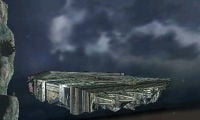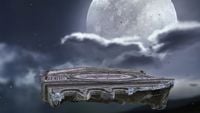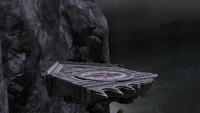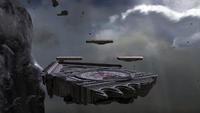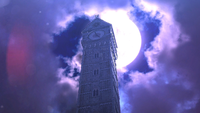Umbra Clock Tower: Difference between revisions
mNo edit summary |
(Unsure if changed in Ultimate) |
||
| Line 23: | Line 23: | ||
==Stage overview== | ==Stage overview== | ||
Umbra Clock Tower is identical in layout in both {{for3ds}} and {{forwiiu}}. The battle begins and takes place on the face of the clock tower, while in an infinite free fall. The clock face itself is slightly recessed from the surface of the broken tower piece, creating a small incline. Occasionally, falling debris comes close to the main clock face [[platform]], serving as extra platforms; both hard and soft platforms can appear, creating temporary [[walk-off]]s and [[Cave of life|caves of life]]. There are seven possible layouts that appear in a random but sequential order. Similarly to [[Town and City]], the layouts themselves contain many platforms moving in different directions, then eventually leaving the stage. | Umbra Clock Tower is identical in layout in both {{for3ds}} and {{forwiiu}}. The battle begins and takes place on the face of the clock tower, while in an infinite free fall. The clock face itself is slightly recessed from the surface of the broken tower piece, creating a small incline. Occasionally, falling debris comes close to the main clock face [[platform]], serving as extra platforms; both hard and soft platforms can appear, creating temporary [[walk-off]]s and [[Cave of life|caves of life]]. There are seven possible layouts that appear in a random but sequential order. Similarly to [[Town and City]], the layouts themselves contain many platforms moving in different directions, then eventually leaving the stage. Unlike [[Kalos Pokémon League]] and [[Wily Castle]], and similar to [[Wii Fit Studio]], this stage forces characters to fall through soft platforms as they exit, preventing [[Star KO]]s. | ||
The layout of each set of platforms are as follows: | The layout of each set of platforms are as follows: | ||
Revision as of 21:02, April 25, 2019
- "Affinity" redirects here. For the Smasher, see Smasher:Affinity.
| Umbra Clock Tower | |
|---|---|
{{{content1}}}
{{{content2}}}
{{{content3}}} Umbra Clock Tower as it appears in Smash. 
| |
| Universe | Bayonetta |
| Appears in | SSB4 Ultimate |
| Availability | Downloadable (SSB4) Starter (Ultimate) |
| Crate type | Normal |
| Maximum players | 4 (3DS) 8 (Wii U and Ultimate) |
Umbra Clock Tower (アンブラの時計塔, Umbra Clock Tower) is a stage from the Bayonetta series. It is the final downloadable content stage in Super Smash Bros. 4, released on February 3rd, 2016. The stage returns in Super Smash Bros. Ultimate. In Ultimate, Bayonetta is fought here for her unlock battle.
Stage overview
Umbra Clock Tower is identical in layout in both Super Smash Bros. for Nintendo 3DS and Super Smash Bros. for Wii U. The battle begins and takes place on the face of the clock tower, while in an infinite free fall. The clock face itself is slightly recessed from the surface of the broken tower piece, creating a small incline. Occasionally, falling debris comes close to the main clock face platform, serving as extra platforms; both hard and soft platforms can appear, creating temporary walk-offs and caves of life. There are seven possible layouts that appear in a random but sequential order. Similarly to Town and City, the layouts themselves contain many platforms moving in different directions, then eventually leaving the stage. Unlike Kalos Pokémon League and Wily Castle, and similar to Wii Fit Studio, this stage forces characters to fall through soft platforms as they exit, preventing Star KOs.
The layout of each set of platforms are as follows:
- Two soft platforms, one just above the ledge on the right and another one higher the first one to the left of it
- Three soft platforms, two lower than the stage on either side and one in the middle just above
- One hard platform that moves over the stage from right to left
- Two soft platforms, one at the center of the main stage slightly above it and another smaller one above the other platform to it's left
- Two soft platforms to either side of the stage (both of which are walk-offs)
- Two soft platforms, one below the stage that acts as a Cave of Life and another one just below the ledge on the right side (this platform can be used to reach the former for characters with short recoveries)
- Three soft platforms, two above the ledge on either side which slant away from the stage and a third that is close to the top of the screen in the middle of the main stage (this platform can fall to the height of the other two platforms)
The soft platforms tend to move around sporadically but generally don't move far
Players enter and exit the alternate world of Purgatorio throughout the match, which is indicated by a specific sound and a very large rising purple portal that represents Umbra Witch magic. The angels Affinity and Inspired only appear and fly around in the background of Purgatorio, and occasionally the enormous Fortitudo comes close to the playing field and lets out a powerful roar, shaking the screen. However, none of them have an actual effect on the battle and mostly act as extravagant aesthetics. In 8-Player Smash, it does not enter the world of Purgatorio, hence the angels won't show up in the background.
Star KOs and Screen KOs are disabled in both versions of Smash 4. This makes it one of two stages in Smash 3DS where Screen KOs cannot occur, with the other being Super Mario Maker. It is also the only stage in the game where only Blast KOs occur.
Ω forms and Battlefield form
In Super Smash Bros. 4, the Ω form is mostly identical to the normal form of the stage, but the extra debris platforms will no longer appear, and, as a result, the camera will no longer zoom and shift. The clock face is no longer slightly recessed and is completely flat. The angels still appear, including Fortitudo and its roar.
In Super Smash Bros. Ultimate, the Ω form and Battlefield form are similar to the Ω form in SSB4; however, the main platform is resized and reshaped to match Final Destination and Battlefield, respectively. The three soft platforms of the Battlefield form are made of stone and resemble the stone debris platforms that occasionally appear in the normal form.
Origin
The Umbra Clock Tower is a reference to the opening of Bayonetta, where Bayonetta and Jeanne fight angels on top of a falling clock tower face during the Witch Hunts. The stage also appears in Bayonetta 2 when Bayonetta is sent back in time. Forced to re-experience the Witch Hunts all over again, while fighting by the side of her mother Rosa, Bayonetta and Rosa witness the clock tower's destruction first-hand, due to two giant fireball attacks by the angel Fortitudo. The resulting explosion causes Bayonetta and Rosa to fall off a cliff together—a different side to the one Bayonetta's past self and Jeanne fell off.
As it begins crumbling, Rosa calls the tower the "Symbol of the Umbran Way" and begins mourning its destruction, showing that the tower itself had significant meaning to the Umbran culture and their way of life.
- Inspired - Bayo1.png
Inspired, as it appears in Bayonetta.
In the Bayonetta series, there are three different dimensions called the Trinity of Reality: the Human World, Paradiso, and Inferno. Purgatorio, an alternate reality to the Human World which Angels and Demons can use to influence the Human World without having to directly enter it, exists between them.
Tournament legality
Umbra Clock Tower is currently listed as a Counterpick/Banned stage in competitive play, but this ruling has been heavily disputed in the community. Arguments to ban the stage include the appearance of temporary walk-offs (even though many of the walk-offs can be escaped from below) and that the platform that briefly appears below the stage creates a temporary cave of life, and any fighter on that platform when it leaves can be easily edgeguarded. It was also suggested that the Purgatorio background can be distracting to some players with attention problems, like the backgrounds of Final Destination and Lylat Cruise. Tournaments that have larger stage lists that encompass stages such as Delfino Plaza and Castle Siege have been more likely to allow the stage as a counterpick, but so far it has not been used in any major tournaments because these larger events have more restrictive rulesets. The stage is also said to cause motion sickness for some players due to the constantly moving background.
However, some smashers argue that the stage was banned without proper testing, saying that the stage as a whole is less intrusive than the likes of Pokémon Stadium (which has always been legal in Melee) and that its inclusion would give a new option with big blast zones to the stage list, which currently has several stages heavily benefiting characters that K.O at the top. Despite this, the stage has remained banned in most major rulesets and has only been legal at smaller tournaments.
Gallery
Super Smash Bros. 4
Umbra Clock Tower in Super Smash Bros. for Nintendo 3DS.
Bayonetta on Umbra Clock Tower in Super Smash Bros. for Nintendo 3DS.
Umbra Clock Tower in Super Smash Bros. for Wii U.
Inspired's appearance in Super Smash Bros. for Wii U.
Super Smash Bros. Ultimate
A closeup of Bowser on the stage.
Cloud using Cross Slash on Diddy Kong on the stage.
Knuckles mid-air on the stage.
Marshadow stunning Bowser Jr. with Spectral Thief on the stage.
Meta Knight on the stage.
Young Link in his alternate costume based off of Dark Link using his down aerial on the stage.
Rosalina & Luma using their side taunt on the stage.
Alucard attacking Meta Knight on the stage.
- BayonettaIsabelleBattleReadyUltimateUmbraClockTower.jpg
Isabelle and Bayonetta on the stage, ready to fight.
Trivia
- The time shown on the face of the clock matches the respective game system's internal clock in real-time. However, if the game is paused, the clock stops counting, and when un-paused, the clock instead skips ahead and resumes counting from the current time on the system.
- In Super Smash Bros. for Wii U, both the Fortitudo and Inspired angels in the background are rendered as 3D models, while in Super Smash Bros. for Nintendo 3DS they are sprites due to hardware limitations.
- The Affinities appears as sprites in both versions of the game, but animate at 60 FPS in Super Smash Bros. for Wii U and 30 FPS Super Smash Bros. for Nintendo 3DS.
- This is the only stage in Super Smash Bros. for Wii U without Screen KOs to appear in demo sequences.
External links
- Umbra Clock Tower on Bayonetta Wiki
|
| |
|---|---|
| Fighter | Bayonetta (SSB4 · SSBU) |
| Assist Trophy | Rodin |
| Stage | Umbra Clock Tower |
| Other | Madama Butterfly |
| Trophies and Spirits | Trophies · Spirits |
| Music | SSB4 · Ultimate |
